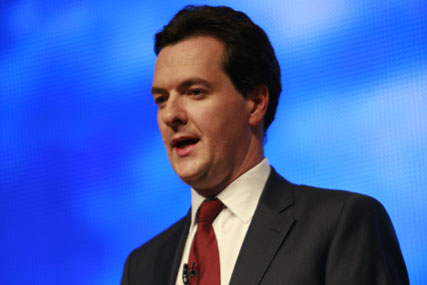
Shadow Chancellor George Osborne yesterday pledged that the Government's advertising budget would be among the first to be cut by a new Conservative government, in an interview with Sophie Raworth on the BBC's Andrew Marr Show.
After highlighting that Britain now has the biggest financial deficit of any major economy, Osborne confirmed the marketing budget handled by the COI, which last year amounted to £540 million, was the place to begin the necessary changes.
"There is a limit to what you can do in-year [the next tax year]," he said, "but you've got to make a start.
"For example, we can move quickly on the advertising budget, the big government consultancy budget, [and] there are child trust funds which go to rich people in this country..."
The Government was the UK's largest advertiser in 2009 following an increase of 43% year on year. It was responsible for campaigns ranging from recruiting teachers to helping people give up smoking, and recycling to tax returns.
The shadow chancellor's comments advance a previous Tory commitment to save £230 million in marketing a year if elected. It comes on a weekend in which the party was accused by its rivals of backing down from indications it would make wide-ranging, immediate cuts.
Interviewer Raworth suggested any savings made in marketing would amount to a drop in the ocean in the greater scheme of things, and accused Osborne of "just tinkering at the edges".
The would-be-chancellor remained adamant: "We need to make a start. We need to show the world that we can deal with this largest budget deficit."
He warned of a "Greek-style" budget crisis that would unfold under Labour's plans to prop up the country for another year with government spending.
"We need a new British economic model that finds new sources of growth, exports, business investment," he said. "The private sector starting to create jobs instead of the public sector jobs being created."
Osborne pointed to "superfast broadband" as an essential component for the country's future and dismissed Labour's goal of two megabits per second broadband for all, as detailed in Digital Britain, as a "woefully poor ambition".
"The next Conservative Government is going to aim to have 100 megabit broadband to the majority of the population by 2017," he said.
"In the 19th Century we built the railways, in the 20th century we built the motorways, in the 21st Century let's build the superfast broadband network that will bring hundreds of thousands of jobs for Britain."
Osborne then unveiled a controversial plan to deliver the network by breaking up British Telecom's monopoly to allow companies like Carphone Warehouse and Virgin to compete.
"If we find the market [still] can't do that, then use the BBC licence fee, the digital switchover money in the BBC licence fee, to get broadband out to the rest of the country."

